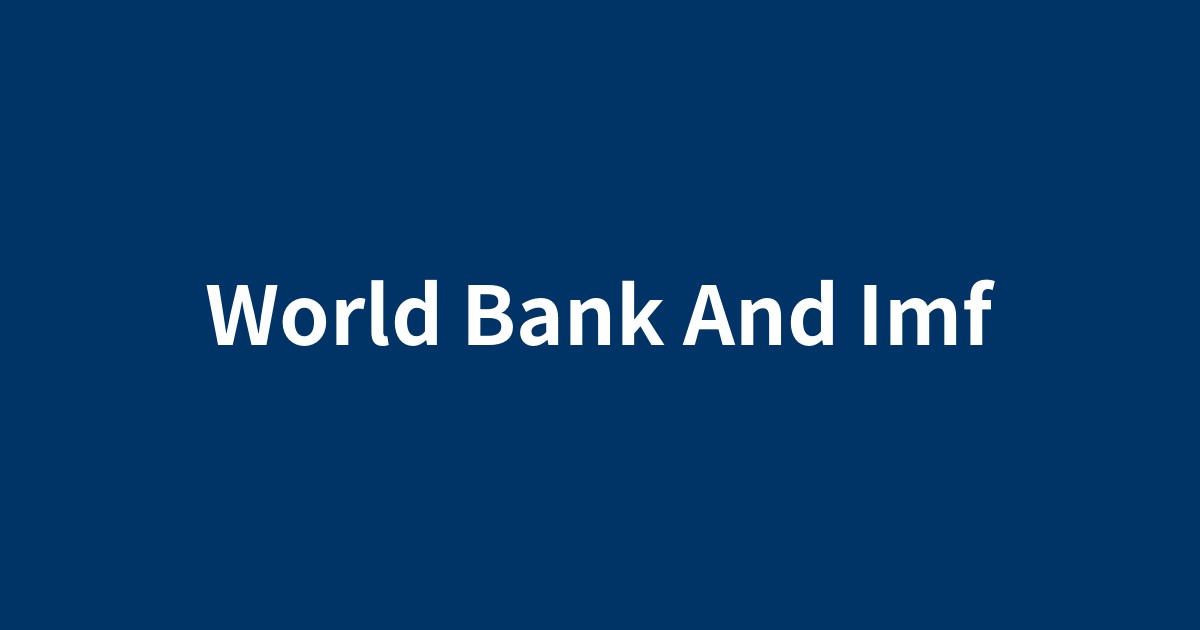このページは、歴史や文化の物語を楽しみながら、その文脈の中で重要な英単語を自然に学ぶための学習コンテンツです。各セクションの下にあるボタンで、いつでも日本語と英語を切り替えることができます。背景知識を日本語で学んだ後、英語の本文を読むことで、より深い理解と語彙力の向上を目指します。

【ご注意】
この記事には、健康、金融、法律など、読者の人生に大きな影響を与える可能性のある情報が含まれています。内容は一般的な情報提供を目的としており、専門的なアドバイスに代わるものではありません。重要な判断を下す前には、必ず資格を持つ専門家にご相談ください。
第二次世界大戦後の復興と発展のために設立された、二つの国際金融機関。それぞれのmission(使命)と、現代世界における役割の違い。
この記事で抑えるべきポイント
- ✓世界銀行とIMFは、第二次世界大戦後の経済復興と安定を目指し、1944年の「ブレトン・ウッズ協定」に基づいて設立された国際金融機関であること。
- ✓世界銀行の主なmission(使命)は、開発途上国の貧困削減やインフラ整備など、長期的な「開発」支援にあること。
- ✓IMF(国際通貨基金)の主なmission(使命)は、為替相場の安定や、通貨危機といった短期的な金融「危機」に陥った国への救済融資を通じて、国際金融システムの「安定」を維持すること。
- ✓両者は目的(開発 vs 危機対応)や融資期間(長期 vs 短期)で役割が異なるが、現代では協調してグローバルな課題に対応する一方、その融資条件などを巡る批判も存在し、多角的な評価がなされていること。
世界銀行とIMF(国際通貨基金)の役割
第二次世界大戦で荒廃した世界。もし、国々のお金の価値が安定せず、貿易のルールもなければ、世界はどうなっていたでしょうか。この問いへの答えとして、戦後の国際経済秩序を支えるために生まれた「双子」の機関、世界銀行とIMFの物語が始まります。なぜ二つの機関が必要だったのか、その誕生の秘密に迫ります。
The Roles of the World Bank and the IMF
Imagine a world devastated by the Second World War. What would have happened if the value of nations' currencies was unstable and there were no rules for trade? The story of the World Bank and the IMF, the 'twin' institutions born to support the post-war international economic order, begins as an answer to this question. Let's delve into the secret of their birth and why two separate institutions were necessary.
「ブレトン・ウッズの双子」誕生の背景
1944年、第二次世界大戦の終結が見え始めた頃、連合国44カ国の代表が米国のニューハンプシャー州ブレトン・ウッズに集結しました。彼らの目的は、二度と世界的な経済危機を繰り返さないための、新たな国際経済の枠組みを構築することでした。この会議で合意されたのが、歴史に名高い「ブレトン・ウッズ協定(Bretton Woods Agreement)」です。大恐慌と二つの大戦という痛ましい経験から、国際社会は「通貨の安定」と「復興開発」が平和の礎であると学びました。この二つの重要な役割を担うため、国際通貨基金(IMF)と世界銀行という二つの柱が、いわば「双子」として同時に構想されたのです。
The Birth of the 'Bretton Woods Twins'
In 1944, as the end of World War II was in sight, representatives from 44 Allied nations gathered in Bretton Woods, New Hampshire, USA. Their goal was to establish a new international economic framework to prevent a recurrence of a global economic crisis. The agreement reached at this conference is the historically renowned Bretton Woods Agreement. From the painful experiences of the Great Depression and two world wars, the international community learned that currency stability and reconstruction were the cornerstones of peace. To undertake these two crucial roles, the International Monetary Fund (IMF) and the World Bank were conceived simultaneously as 'twins'.
世界銀行のmission:貧困なき世界を目指す「開発」のパートナー
世界銀行の当初の役割は、戦争で破壊されたヨーロッパ諸国の復興支援でした。しかし、時代が移り変わるにつれて、その主要な使命(mission)は、開発途上国の「貧困削減(poverty reduction)」へと大きく舵を切りました。世界銀行は、長期的な視点に立ち、対象国の持続的な「開発(development)」を支援するパートナーとなります。例えば、経済活動の基盤となる道路や橋、発電所といったインフラ整備から、国民の生活の質を向上させる教育や保健医療プロジェクトまで、その支援は多岐にわたります。これらのプロジェクトに対し、長期的な「融資(loan)」を提供することで、国が自立的に成長していくための土台作りを手伝っているのです。
The World Bank's Mission: A Partner in 'Development' for a World Free of Poverty
The World Bank's initial role was to support the reconstruction of European countries destroyed by the war. However, as times changed, its primary mission shifted significantly toward poverty reduction in developing countries. The World Bank acts as a partner, supporting the sustainable development of target countries from a long-term perspective. Its support is diverse, ranging from infrastructure projects like roads, bridges, and power plants that form the basis of economic activity, to education and healthcare projects that improve people's quality of life. By providing long-term loans for these projects, it helps build the foundation for countries to grow independently.
IMFのmission:世界経済の「番人」としての役割
一方、国際通貨基金(IMF)は、世界の「金融安定(financial stability)」を守る「番人」としての役割を担います。その主な活動は、世界各国の為替レートの動きを監視し、国際金融システム全体がスムーズに機能するよう目を光らせることです。そして、ある国が深刻な国際収支の赤字に陥り、自国通貨の価値が暴落するような通貨「危機(crisis)」に直面した際には、救世主として登場します。IMFは、政策の改善を条件に緊急の短期「融資(loan)」を提供し、経済の破綻を防ぎます。1990年代のアジア通貨危機など、歴史上の多くの金融危機において、IMFはその「火消し役」としての機能を発揮してきました。
The IMF's Mission: The 'Guardian' of the Global Economy
On the other hand, the International Monetary Fund (IMF) serves as the 'guardian' of global financial stability. Its main activities are to monitor the exchange rate movements of countries worldwide and to ensure the smooth functioning of the entire international financial system. When a country faces a severe balance of payments deficit and a currency crisis, with its currency value plummeting, the IMF steps in as a savior. The IMF provides emergency short-term loans, conditional on policy improvements, to prevent economic collapse. In many financial crises throughout history, such as the Asian financial crisis of the 1990s, the IMF has demonstrated its function as an economic 'firefighter'.
似て非なる二つの機関:目的と手段の違い
世界銀行とIMFは、ワシントンD.C.に本部を置き、互いに協力し合う関係ですが、その役割は明確に区別されています。両者の違いは、主に三つの軸で理解することができます。第一に「目的」。世界銀行が長期的な「開発(development)」と貧困削減を目指すのに対し、IMFは短期的な金融「危機(crisis)」への対応と経済の安定化を目的とします。第二に「融資期間」。世界銀行の融資は15年〜20年にも及ぶ長期ですが、IMFの融資は3年〜5年程度の短期です。第三に「対象」。世界銀行の支援は特定のプロジェクトに向けられますが、IMFの支援は国全体の経済政策そのものを対象とします。
Similar yet Different: The Distinction in Purpose and Means
Although the World Bank and the IMF are headquartered in Washington, D.C., and cooperate with each other, their roles are clearly distinct. The differences between them can be understood along three main axes. First, 'purpose': the World Bank aims for long-term development and poverty reduction, whereas the IMF focuses on responding to short-term financial crises and stabilizing economies. Second, 'loan duration': World Bank loans are long-term, often spanning 15 to 20 years, while IMF loans are short-term, typically 3 to 5 years. Third, 'target': World Bank assistance is directed at specific projects, whereas IMF support targets a country's overall economic policy.
現代における役割と課題:問われる存在意義
グローバル化が深化し、世界経済が複雑に絡み合う現代において、両機関は新たな課題に直面しています。気候変動対策、パンデミックへの備え、そして中国をはじめとする新興国の台頭など、設立当初には想定されていなかった問題への対応が求められています。また、特にIMFが融資を行う際に課す厳しい「条件(conditionality)」が、融資を受ける国の経済主権を侵害し、かえって貧困を拡大させているのではないか、という批判も根強く存在します。その功績が称えられる一方で、ガバナンスのあり方や融資条件の妥当性について、その存在意義が常に問われているのです。
Modern Roles and Challenges: Questioning Their Raison d'Être
In today's world of deepening globalization and complex global economic interdependence, both institutions face new challenges. They are required to respond to issues unforeseen at their inception, such as climate change, pandemic preparedness, and the rise of emerging economies like China. Furthermore, there is persistent criticism that the strict conditionality imposed, especially by the IMF, when providing loans infringes on the economic sovereignty of recipient countries and may actually exacerbate poverty. While their achievements are celebrated, their raison d'être is constantly being questioned regarding their governance and the appropriateness of their lending conditions.
結論
世界銀行とIMFは、戦後の荒廃から立ち直ろうとする世界の理想から生まれた、国際協調の象徴です。両機関は、それぞれの明確な「使命(mission)」に基づき、世界の経済的安定と発展に大きく貢献してきました。しかし、その活動は常に順風満帆だったわけではなく、その手法やガバナンスには今なお多くの課題が指摘されています。この記事を通じて、現代のグローバル経済を支える複雑な仕組みの光と影を理解することが、これからの国際金融のあり方を考える上での、確かな第一歩となるでしょう。
Conclusion
The World Bank and the IMF are symbols of international cooperation, born from the ideals of a world striving to recover from the devastation of war. Based on their distinct missions, both institutions have contributed significantly to the world's economic stability and development. However, their activities have not always been smooth sailing, and many challenges regarding their methods and governance remain. Understanding the light and shadows of the complex mechanisms that support the modern global economy through this article will be a solid first step in considering the future of international finance.
テーマを理解する重要単語
loan
「融資」や「貸付」を意味し、世界銀行とIMFがその目的を達成するための主要な手段です。この記事の核心は、両機関の「融資」の違いにあります。世界銀行が長期的な開発プロジェクトに、IMFが短期的な経済危機に対して融資を行うという対比を理解することが、両者の役割分担を把握する上で不可欠です。
文脈での用例:
He took out a loan from the bank to start his own business.
彼は自身の事業を始めるために銀行から融資を受けました。
mission
単なる「目的(purpose)」や「目標(goal)」よりも、より崇高で長期的な「使命」という強い意味合いを持つ単語です。この記事では世界銀行の「貧困なき世界」やIMFの「世界経済の安定」といった、両機関の存在意義そのものを示すために使われており、その活動の根幹にある理念を理解する鍵となります。
文脈での用例:
The company's mission is to provide affordable healthcare for everyone.
その会社の使命は、誰もが利用しやすい価格の医療を提供することです。
institution
記事の主役である世界銀行とIMFを指す基本単語です。単なる「組織」よりも、公的で社会的な目的を持つ大規模な「機関」というニュアンスが強く、戦後の国際秩序を支えるために設立された両機関の性格を的確に表しています。この単語を理解することが、記事全体のテーマを掴む第一歩となります。
文脈での用例:
Marriage is a social institution that exists in almost every culture.
結婚は、ほぼ全ての文化に存在する社会的な制度です。
crisis
「危機」を意味し、特に国の経済が破綻しかねない重大な局面を指します。この記事では、IMFが「救世主」や「火消し役」として登場する「通貨危機」や「金融危機」の文脈で使われます。世界銀行が平時の「開発」を担うのに対し、IMFが有事の「危機対応」を担うという、両機関の役割の根本的な違いを明確に示しています。
文脈での用例:
The country is facing a severe economic crisis.
その国は深刻な経済危機に直面している。
sustainable
「持続可能な」という意味で、環境や社会に配慮し、将来の世代の利益を損なうことなく続けられることを指します。この記事では、世界銀行が目指す「持続的な開発(sustainable development)」という重要な概念を構成します。単なる目先の経済成長ではなく、長期的で健全な発展を支援するという同行の現代的な役割を理解する上で不可欠です。
文脈での用例:
We need to find a sustainable source of energy.
私たちは持続可能なエネルギー源を見つける必要があります。
development
この記事における世界銀行の役割を象徴する中心的な単語です。単なる経済成長だけでなく、インフラ整備、教育、保健医療といった分野を含め、国が長期的かつ持続的に発展していくための包括的な取り組みを指します。IMFの短期的な危機対応との明確な違いを理解する上で極めて重要です。
文脈での用例:
The company is focused on product development.
その会社は製品開発に注力している。
stability
「安定性」を意味し、この記事ではIMFの核心的な使命である「金融安定(financial stability)」を理解するために不可欠です。為替レートの急激な変動や金融システムの混乱を防ぎ、世界経済が予測可能でスムーズに機能する状態を指します。世界銀行の「開発」と対をなす、IMFの役割を象徴するキーワードです。
文脈での用例:
Economic stability is crucial for the long-term growth of a country.
経済の安定は、国の長期的な成長にとって極めて重要である。
reconstruction
「再建」や「復興」を意味します。この記事では、世界銀行が設立された当初の主要な目的、すなわち第二次世界大戦で破壊されたヨーロッパ諸国の経済的・物理的な立て直しを指しています。現在の開発支援という役割との対比を理解することで、世界銀行の使命の変遷をより深く把握することができます。
文脈での用例:
The period after the Civil War is known as the Reconstruction era.
南北戦争後の時代は、再建時代として知られている。
sovereignty
国家が他国からの干渉を受けずに、自国の事柄を自ら決定できる権利、すなわち「主権」を意味します。この記事では、IMFが融資の条件として課す厳しい財政緊縮策などが、融資を受ける国の「経済主権」を侵害しているという批判を理解する上で鍵となります。国際協力と国家主権の間の緊張関係を示す重要な概念です。
文脈での用例:
The nation fought to defend its sovereignty against foreign invasion.
その国は外国の侵略から自国の主権を守るために戦った。
framework
「骨組み」や「構造」を意味し、この記事では戦後の国際経済秩序の土台となった「ブレトン・ウッズ協定」の構造を指して使われています。物事の全体像や基本構造を指す言葉であり、二度と経済危機を繰り返さないためのルールや制度の集合体という、協定の重要性を理解する上で不可欠な単語です。
文脈での用例:
We need to establish a legal framework to deal with this issue.
我々はこの問題に対処するための法的枠組みを確立する必要がある。
governance
組織や国家の「統治」や「管理」のあり方を指す言葉です。この記事では、世界銀行やIMFの意思決定プロセスや運営方法、特に先進国に偏りがちな議決権の配分などが問われている文脈で使われます。両機関が直面する現代的な課題や、その存在意義への問いを理解するためのキーワードです。
文脈での用例:
The company was criticized for its poor corporate governance.
その会社は、ずさんな企業統治を批判された。
conditionality
国際機関、特にIMFが融資を行う際に、相手国に課す政策変更などの「条件」を指す専門用語です。この記事の後半で指摘される、IMFに対する批判の核心を理解するための最重要単語です。この条件が国の主権を侵害し、かえって国民を苦しめることがあるという議論の背景を把握する上で欠かせません。
文脈での用例:
The IMF's loans often come with strict conditionality regarding economic policy.
IMFの融資には、経済政策に関する厳しい条件が付されることが多い。